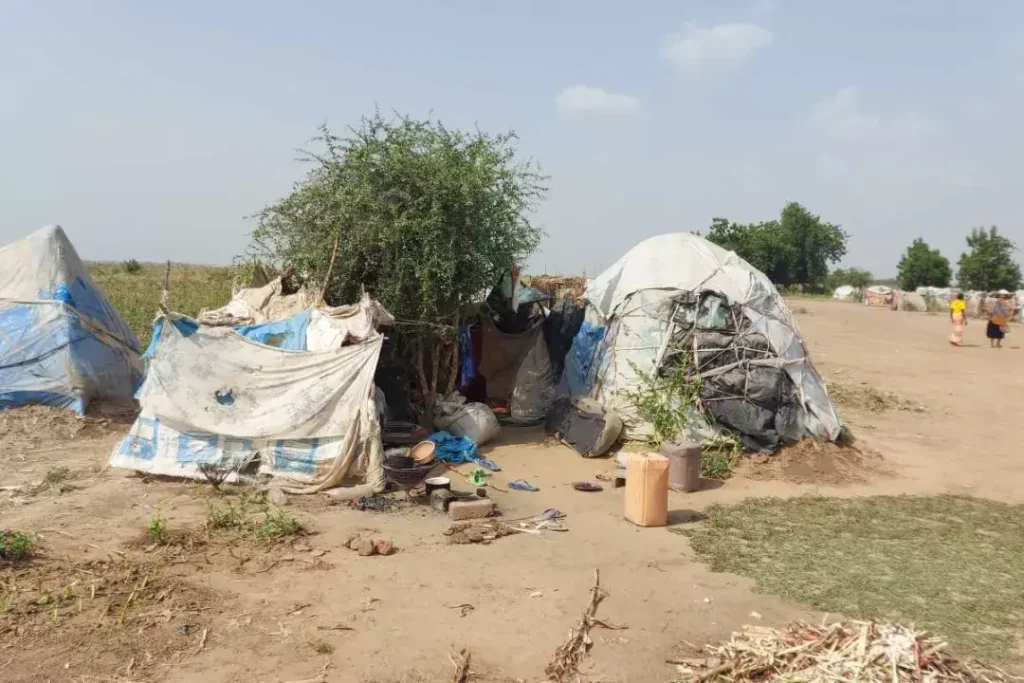In Cameroon’s arid Far North region, the harsh realities of climate change are intensifying long-standing ethnic tensions, driving communities into conflict over dwindling resources. The shrinking of Lake Chad, coupled with rising temperatures and erratic rainfall, has sparked violent clashes between the Choa Arab herders and Mousgoum fishermen, displacing thousands and deepening divisions in an already volatile region.
A Humanitarian Crisis Unfolds
In the makeshift Bogo camp, about 4,000 ethnic Arabs have sought refuge after fleeing violence near Kousseri, a river town roughly 100 kilometers from Lake Chad. Their homes, constructed from branches and dry leaves, blend into the barren landscape. Men gather under the shade of trees to discuss their plight, while women prepare meager meals under the relentless Sahel sun, and children play nearby.
The violence, which erupted in August and December last year, resulted in at least 67 deaths, hundreds of injuries, and the destruction of Kousseri’s cattle market. Approximately 100,000 people were displaced, with many seeking safety in neighboring Chad or Maroua, the regional capital. “We lost everything and walked 175 kilometers to find safety here,” said Mahamat Sale, the 60-year-old leader of the Bogo camp. “The Mousgoum see us as invaders, but here we are tolerated.”
Climate Change as a Conflict Catalyst
The root of the conflict lies in competition for water, a resource growing scarcer due to climate change. The Mousgoum’s practice of digging pools to capture water for fishing often clashes with the Choa Arabs’ need to access water for their cattle. This tension, exacerbated by environmental stress, spiraled into deadly violence.
A 2019 report by the Europe-based think tank Adelphi highlighted a “vicious circle” where climate stress amplifies community vulnerabilities, intensifying competition for resources and fueling conflict. “When economic conditions worsen, people retreat to ethnic and religious identities, raising the risk of violence,” explained Armel Sambo, a history professor at the University of Maroua. Historically, the Mousgoum, considered native to the region, view the nomadic Choa Arabs as intruders, further complicating coexistence.
The Shrinking Lake Chad
Lake Chad, once a vast expanse comparable to Lake Erie, has lost over 90% of its surface area since 1963, shrinking from 26,000 square kilometers to less than 1,500 square kilometers. Increased irrigation, human demand, and reduced rainfall have driven this decline, threatening the livelihoods of millions who depend on the lake for fishing, agriculture, and livestock. While the Kousseri area has been spared attacks by jihadist groups like Boko Haram and ISWAP, which use the lake’s basin as a haven, the environmental crisis remains a persistent threat.
Seeking Solutions Amid Fragility
Efforts to restore calm have had limited success. Mahamat Djidda Mahamat, a 20-year-old Kousseri resident who lost his father and home in the clashes, expressed cautious hope: “I just want to live in peace, but I avoid the Arabs now.” Regional governor Bakari Midjiyawa claimed the area is now secure, with some residents returning home. However, sustainable solutions remain elusive.
Professor Sambo emphasized the need for long-term strategies, including “designated seasonal livestock trails, dedicated water points for each community, and monitored mediation by traditional chiefs.” He stressed that government involvement is critical to ensuring safe movement and fostering dialogue. Without these measures, disputes risk escalating into further violence.
A Broader Call for Action
The potential disappearance of Lake Chad looms as a catastrophic threat, jeopardizing the survival of millions across Cameroon, Chad, Niger, and Nigeria. Xavier Bourgois, a spokesperson for UNHCR, underscored the urgency of addressing the crisis: “Global warming and water access issues have catalyzed tensions. We must bring stakeholders together to identify root causes and implement adaptive solutions.”
As Cameroon’s Far North grapples with the intertwined challenges of climate change and ethnic strife, the path forward requires coordinated efforts to manage resources equitably and promote peace. Without decisive action, the region risks further instability, with consequences that could ripple across the Sahel.






